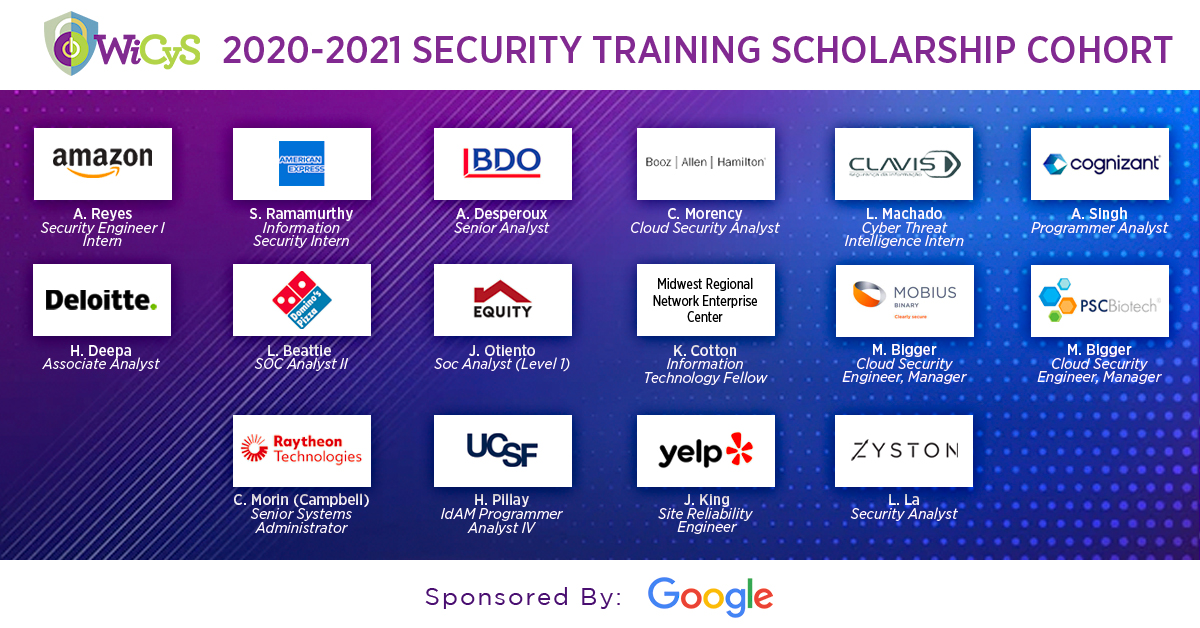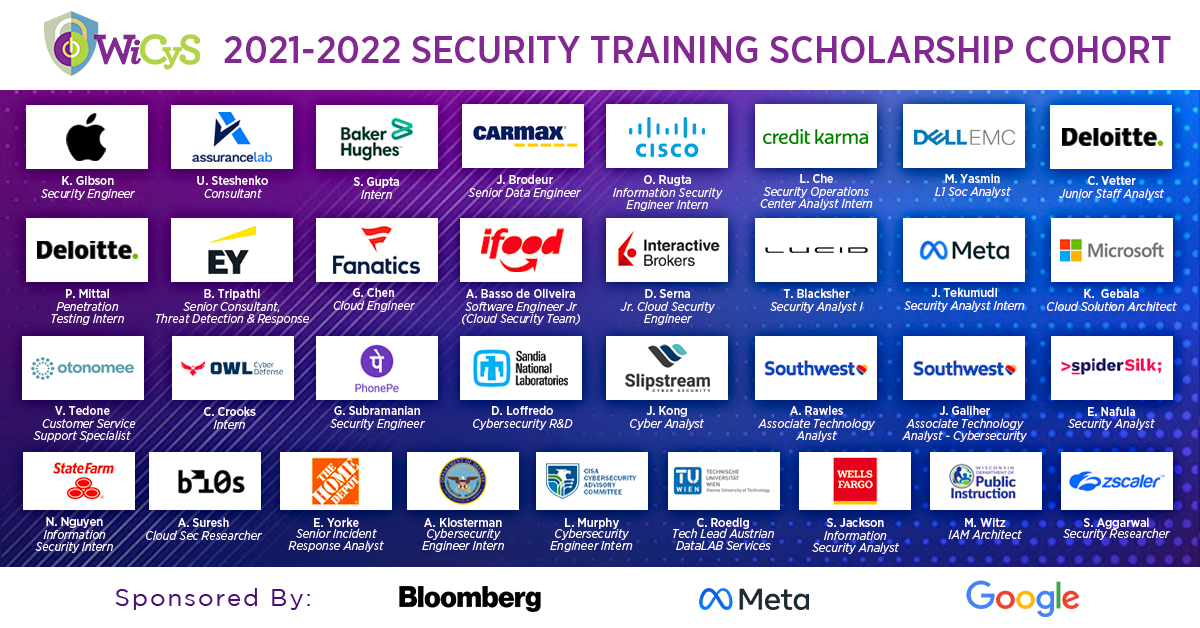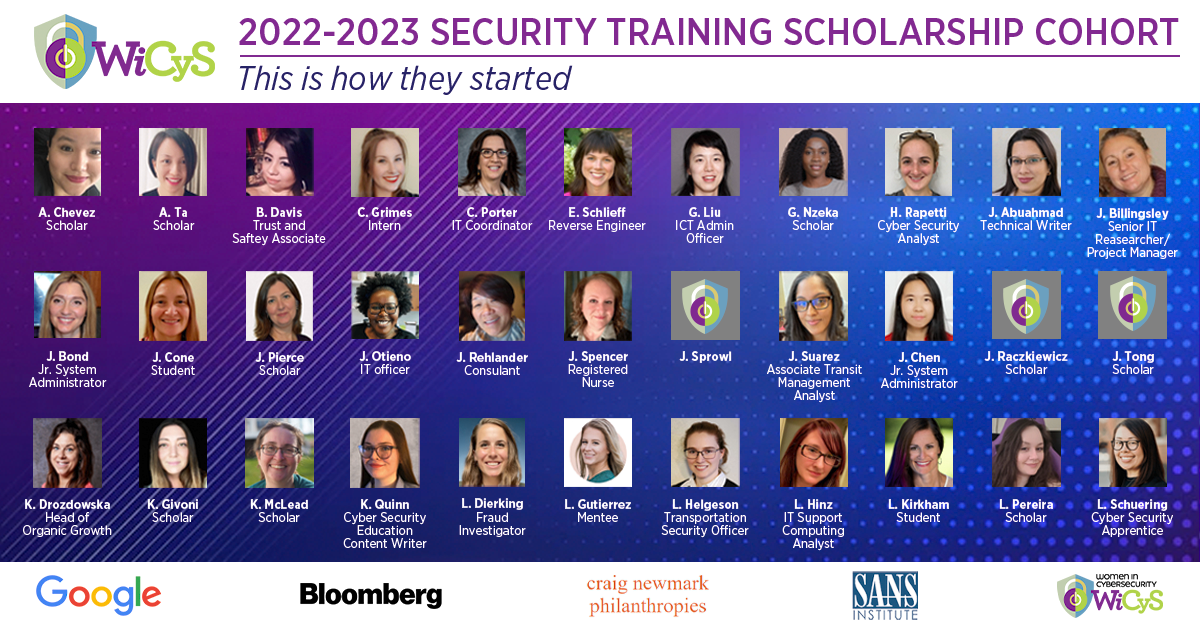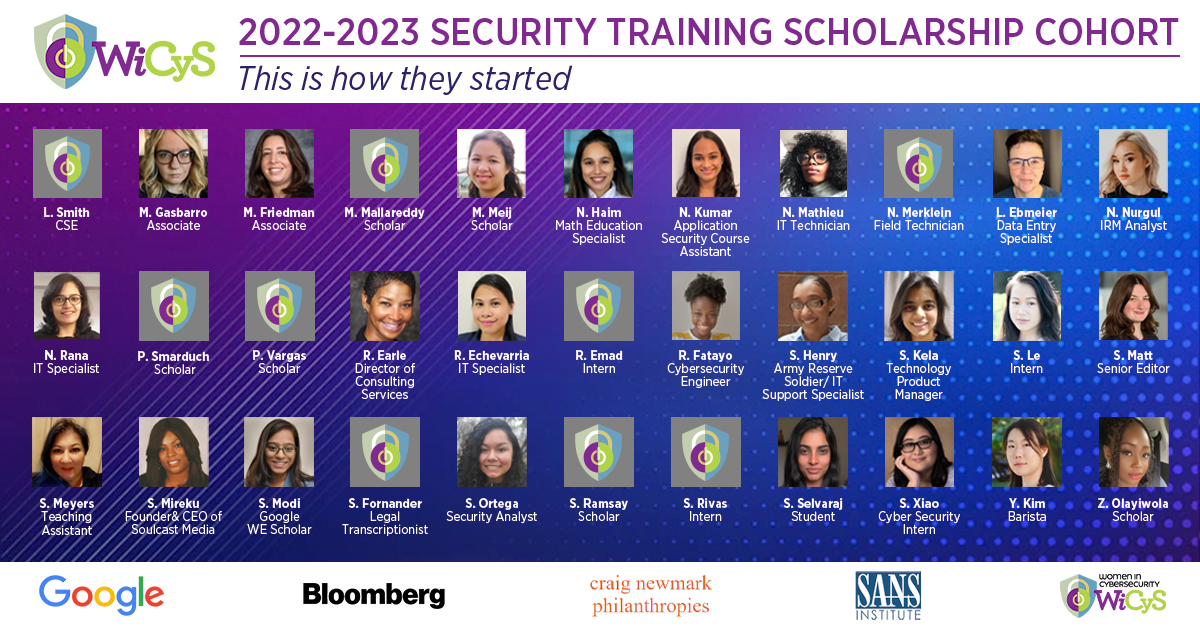WiCyS Security Training Scholarship
In partnership with the SANS Institute, WiCyS is proud to offer the Security Training Scholarship made possible by WiCyS Tier 1 Partners and Premier Supporters.
Applications open August 1, 2025.

The WiCyS Security Training Scholarship made possible by WiCyS Tier 1 Partners and Premier Supporters is a multi-staged scholarship opportunity for WiCyS members. Those selected will participate in a reliable pathway to launch and advance in their cybersecurity careers through skills development. The focus of this scholarship is to award WiCyS members who are seeking cybersecurity employment within the next 1.5 years. The program is designed for students and/or career changers!
Build and leverage the power of community. During each stage of the scholarship, a cohort is established with mentors and peers to help guide and support recipients. This powerful network will be there through every step of the scholarship experience to lean in on. The collective strength of all involved is priceless.
Veteran and Military Spouse Track. WiCyS acknowledges the significant contributions that veterans and military spouses make to the cybersecurity sector, leveraging their military experience and mission-oriented backgrounds. With the generous support of Craig Newmark Philanthropies, WiCyS is pleased to offer enhanced support services. These services include mentorship opportunities, incentives, visibility with WiCyS employer partners, access to WiCyS Military Affiliates, career placement assistance, and travel stipends for conference attendance.
Graduates of the program will be ready to pursue careers in cybersecurity!
All WiCyS members, over age 18, are invited to apply. This training program is composed of multiple stages. Each stage has specific criteria. Throughout the program, continuation to the next stage is based on performance in the previous stage and application data.
What Makes this Program Unique:
- Finds hidden cybersecurity talent
- Elevates those with aptitude, grit, and determination
- Empowers all participants with real-world skills they can continue to build upon
- Changes lives by enabling final-stage participants to start cybersecurity jobs in less than a year of completion
- Provides direct impact on the cybersecurity workforce by launching careers
- If your company/organization is interested in being a premier supporter of the Security Training Scholarship, please fill out the form at the link below:
Stage 1: SANS Beginner-level CTF
All eligible applicants will be invited to participate in the SANS Beginner-level CTF. This beginner-level CTF is a fun and exciting way to practice cybersecurity skills in a friendly environment. This multi-disciplined Capture the Flag system has over 28 content packs and a variety of engaging challenges for participants to discover their strengths while challenging their limits. If new to cybersecurity, Beginner-level CTF is a great place to start as it teaches while challenges are being solved with an integrated hint system.
At the end of Stage 1: 500 candidates will advance to Stage 2
Next Stage/Stage 2 Selection Criteria:
- Application essay
- Performance and Engagement in SANS Beginner-level CTF
- Community engagement in the cohort
Stage 2: Try Hack Me: Gamified Learning
500 recipients will be invited to participate in the Try Hack Me: Gamified Learning. Participants learn by following structured paths and build skills in a real-world environment by completing guided, objective-based tasks and challenges. Even with no previous cyber security interest or experience, participants can build their knowledge and skills through fun, gamified challenges and labs, as well as gain an appreciation and understanding of cybersecurity careers. Participants engage in a “beginner” path to introduce them to cybersecurity, and learn about basic Linux, Networks, OWASP Top 10, different paths in security, and other fundamentals!
At the end of Stage 2: 350 candidates will advance to Stage 3
Next Stage/Stage 3 Selection Criteria:
- Application essay
- Performance during CyberGEN. IQ
- Community engagement in the cohort
Stage 3: CyberGEN.IQ Assessment
350 recipients will be invited to participate in the CyberGEN.IQ Assessment. This will measure the participant’s technical aptitude for cybersecurity learning and fundamental skills to gauge the potential for moving into the next stage of the program.
At the end of Stage 3: 75 candidates will advance to Stage 4
Next Stage/Stage 4 Selection Criteria:
- Performance in CyberGen IQ Assessment
- Community engagement in cohort
- Application essay
Stage 4: SEC275/Foundations + GFACT & AIS 247 AI Security Essentials for Business Leaders
Participants will be invited to participate in the SEC275/Foundations course + GFACT certification exam and AIS 247/ AI Security Essentials for Business Leaders. SEC 275 is an online interactive hands-on learning program that includes 59 modules of foundational material without which students generally struggle in advanced cybersecurity training and in technical cybersecurity roles. Participants will acquire strong understanding of devices and networks while rapidly progressing into the key concepts of protecting digital components. Additionally, the fundamentals of Windows, Linux and programming in two languages widely used by cybersecurity professionals are taught. The course culminates with active labs that introduce key cybersecurity tools, exploits and mitigation techniques.
AIS 247 is essential training for professionals navigating the rapidly evolving landscape of artificial intelligence in the business world. This training provides a thorough exploration of generative AI (GenAI), starting with a foundational understanding of why GenAI has become a key strategic element in various industries. It delves into the mechanisms of GenAI, including topics such as prompt engineering and the complexities of large language models. Participants will gain valuable insights into the common risks associated with GenAI usage, including strategies and tactics for risk mitigation.
Participants of this stage will also be invited to complete the GFACT certification. This certification validates a practitioner’s knowledge of essential foundational cybersecurity concepts. GFACT-certified professionals are familiar with practical skills in computers, technology, and security fundamentals that are needed to kickstart a career in cybersecurity.
At the end of Stage 4: 75 recipients will be invited to participate in the SANS SEC275: Foundations course + GFACT certification exam and AIS 247/ AI Security Essentials for Business Leaders. Recipients will receive a scholarship to the annual WiCyS Conference.
Next Stage/Stage 5 Selection Criteria:
- Successful completion of Stage 4
- Community engagement in cohort
Stage 5: Course 2 SEC401/GSEC and Course 3 SEC504/GCIH +SEC566/GCCC
These recipients will dive deeper into their cybersecurity coursework by continuing in advanced SANS training courses along with the opportunity to complete additional certifications.
Course 2: SEC401 Course and GIAC Security Essentials (GSEC) certification
SEC401 is an interactive hands-on training course. The following is a sample of the lab activities that students will carry out:
- Set up a virtual lab environment
- Conduct tcpdump network analysis
- Use Wireshark to decode network traffic
- Crack passwords
- Use hashings to verify the integrity of digital evidence
- Analyze networks with hping3 and Nmap
- Steganography
- Secure and audit a Windows system against a security template
The GIAC Security Essentials (GSEC) certification validates a practitioner’s knowledge of information security beyond simple terminology and concepts. GSEC certification holders are demonstrating that they are qualified for hands-on IT systems roles with respect to security tasks.
- Active defense, defense in depth, access control & password management
- Cryptography: basic concepts, algorithms and deployment, and application
- Defensible network architecture, networking & protocols, and network security
- Incident handling & response, vulnerability scanning and penetration testing
- Linux security: structure, permissions, & access; hardening & securing; monitoring & attack detection; & security utilities
- Security policy, contingency plans, critical controls and IT risk management
- Web communication security, virtualization and cloud security, and endpoint security
- Windows: access controls, automation, auditing, forensics, security infrastructure, & securing network services
Course 3: SEC504 Course and GIAC Certified Incident Handler (GCIH) certification
SEC504 is for individuals who lead or are a part of an incident handling team. General security practitioners, system administrators, and security architects will benefit by understanding how to design, build, and operate their systems to thwart attacks. Participants will learn:
- How to best prepare for an eventual breach
- The step-by-step approach used by many computer attackers
- Proactive and reactive defenses for each stage of a computer attack
- How to identify active attacks and compromises
- The latest computer attack vectors and how you can stop them
- How to properly contain attacks
- How to ensure that attackers do not return
- How to recover from computer attacks and restore systems for business
- How to understand and use hacking tools and techniques
- Strategies and tools to detect each type of attack
- Application-level vulnerabilities, attacks, and defenses
- How to develop an incident handling process and prepare a team for battle
- Legal issues in incident handling
The GIAC Certified Incident Handler (GCIH) certification validates a practitioner’s ability to detect, respond, and resolve computer security incidents using a wide range of essential security skills. GCIH certification holders have the knowledge needed to manage security incidents by understanding common attack techniques, vectors and tools, as well as defend against and respond to such attacks when they occur. Areas covered are:
- Incident Handling and Computer Crime Investigation
- Computer and Network Hacker Exploits
- Hacker Tools (Nmap, Nessus, Metasploit and Netcat)
SEC566: Implementing and Auditing CIS Controls In SEC566 a selected group of participants will learn how an organization can defend its information by using a vetted cybersecurity control standard. Participants will specifically learn how to implement, manage, and assess security control requirements defined by the Center for Internet Security’s (CIS) Controls. Participants will gain direct knowledge of the CIS Controls and ecosystem of tools to implement CIS controls across the organization’s complex networks, including cloud assets.
(Don't delete this one, it's used to make all items closed)
2024 – 2025 Cohort Timeline
August 1: Launch Webinar
August 1: Applications Open
August 30 at 11:59 pm CT: Applications Close (late applications will not be accepted)
September 9 by 5 pm CT: Notifications for Stage 1 Acceptance Distributed
September 11-13: SANS Beginner-level CTF
September 23 by 5pm CT: Notifications for Stage 2 Acceptance Distributed
September 27 at 6:30pm CT: Stage 2 Welcome Webinar (zoom link in acceptance email and Slack)
September 30: Stage 2 Try Hack Me- Gamified Learning Starts
November 20: Stage 2 Try Hack Me- Gamified Learning Ends
December 12 by 5 pm CT: Notifications for Stage 3 Acceptance Distributed
December 18: Stage 3 CyberGen IQ Assessment Begins
December 22: Stage 3 CyberGen IQ Assessment Ends
January 13 by 5 pm CT: Notifications for Stage 4 Acceptance Distributed
January 21 by 5 pm CT: Commitment forms for Stage 4 Acceptance Due and WiCyS Conference Scholarship Awards
January 27: Tier 4 Kick-off Webinar
January 28: Stage 4-SEC275/ SANS Foundations Begins
April 2-5: WiCyS Conference
April 28: Stage 4-SEC275/SANS Foundations Ends
April 29: Stage 5 -First Course Begins
July 28: Stage 5 – First Course Ends
July 29: Stage 5 – Second Course Begins
October 27: Stage 5 – Second Course Ends
2025 – 2026 Cohort Timeline
August 1: Applications Open
August 5: Launch Webinar
August 30 at 11:59 pm CT: Applications Close (late applications will not be accepted)
September 8 by 5 pm CT: Notifications for Tier 1 Acceptance Distributed
September 10-12: SANS Beginner-level CTF
September 18 by 5pm CT: Notifications for Tier 2 Acceptance Distributed
September 22: Tier 2 Welcome Webinar (zoom link in acceptance email and Slack)
September 22: Tier 2 Try Hack Me- Gamified Learning & CyberGen IQ Assessment Begins
October 27: Tier 2 Try Hack Me- Gamified Learning & CyberGen IQ Assessment Ends
October 30 by 5 pm CT: Notifications for Tier 3 Acceptance Distributed
November 17: Tier 3 AIS247 AI Security Essentials & SEC275 Foundations + GFACT Certification Begins
January 26: Tier 3 AIS247 AI Security Essentials & SEC275 Foundations + GFACT Certification Ends
January 29 by 5 pm CT: Notifications for Tier 4 Acceptance Distributed
January 30 by 5 pm CT: Commitment forms for Tier 4 Acceptance Due and WiCyS Conference Scholarship Awards
February 22: Tier 4 Kick-off Webinar (zoom link in acceptance email and Slack)
February 2: Tier 4: SEC401Security Essentials + GSEC Certification Begins
March 11: WiCyS Conference
April 27: Tier 4: SEC401Security Essentials + GSEC Certification Ends
April 28: Tier 5 -SEC 504 Incident Handling + GCIH Certification Begins
July 21: Tier 5 – SEC 504 Incident Handling + GCIH Certification Ends
WiCyS Security Training Scholarship Program MEDIA:
Read News Release HERE:
(Don't delete this one, it's used to make all items closed)
2020-2021 Security Training Scholarship Highlights

2021-2022 Security Training Scholarship Highlights

2022-2023 Security Training Scholarship Highlights


SUCCESS STORIES
Anna Rawles completed her WiCyS Security Training program with certifications in GFACT, GSEC, and GCIH. Before her admittance to the scholarship, she worked in bioinformatics, analyzing data sets. After attending the WiCyS meeting in Cleveland, she secured an interview and offer with Southwest Airlines as a Associate Technology Analyst. She worked closely with SANS Career Services in preparation for the conference.
SUCCESS STORIES
Merina Witz has been working as an IT Specialist for the Wisconsin Public Department of Instruction for the past 6 years. After being accepted to the WiCyS Security Training scholarship, she earned her GIAC certifications in GFACT, GSEC, and GCIH. Upon completion of her training, she applied for an internal position. She successfully interview and impressed them with her technical skills and received a promotion to IAM Architect. She worked with SANS Career Services on her mock interview.
SUCCESS STORIES
Prior to SANS, Kathleen Gibson’s career was in project management, where she worked in various health and higher education institutions. She has a BA in Musicology and MS in Public Safety Organizational Leadership. During her training in the WiCyS Security Training scholarship, she obtained contract positions in technical project management and security research. After she obtained her GIAC certifications in GFACT, GCLD, and GCPN, her cyber career launched as she accepted a position at Apple as a Security Engineer.

Lauren Gutierrez
“The WiCyS Security Training Scholarship experience has been unlike anything I have experienced in my life. I have gained an incredible support system, and access to hundreds of resources, and have the honor of taking classes with SANS, the most respected cyber training program in the world. I am a mom to two children and a former Kindergarten teacher who made the bold decision to move into cybersecurity. This opportunity has given me a clear path forward to enter the field with confidence knowing that I will not be on this journey alone.”

Andrea Chavez
“This one-of-a-kind experience allowed me to, not only gain new Cybersecurity-related skills, but also gain the most beautiful and genuine friendships I never thought I would find. I feel very blessed and forever thankful to WiCyS, SANS, Google, Meta, Bloomberg and Craig Newmark Philanthropies for this incredible opportunity and I highly encourage everyone to apply.”

Jessica Suarez
“Being a recipient of the WiCyS Security Training Scholarship has provided me with resources, support, and an uplifting community and cohort. This scholarship has fostered growth in my abilities by providing training that may be inaccessible without this opportunity. This has been such an enriching experience, that will undoubtedly shape the direction of my professional career, and life.”

Emily Schlieff
“The Security Training Scholarship provides me with resources to be more successful in my role as a Reverse Engineer for Computershare. Furthermore, I have gained the confidence to join security related projects within my company, which has allowed me to connect with peers in our Security department. I can now fully envision a future as a Cyber Security Analyst.”

Rowena Elaine J. Echevarria
“I am a career-changer. I was so lost before with no mentor/s for guidance on how and where I should start my cybersecurity career. But then, I became a member of the WiCyS Organization – which opened up a lot of opportunities to help me connect with so many talented, supportive, and knowledgeable people while learning the foundations of cybersecurity and building my technical skills through Capture the Flag events.”

Leanne Kirkham
“The WiCyS Security Training Scholarship program gave me an opportunity to comfortably dive headfirst into a new world of cybersecurity with an amazingly supportive cohort. The friendly corroboration of our group during our challenges and projects enabled many of us with different levels of experience to both receive assistance from and also give assistance to others in our group easily. This highly synergistic collaboration has enabled us to cover an intense amount of information in a relatively short period of time; I never felt like I was alone with my questions and so much information was shared between us it would have taken me years on my own to have this quantity of exposure. For me this has proven the power of WiCyS as an organization to advance our careers much more efficiently and enjoyably than trying to go it alone!”

Lindsey Hinz
“This scholarship is a wonderful way to learn foundational knowledge in cyber security and get hands-on experience using the professional skills. Each tier of the scholarship is rewarding but the SANS classes and certifications are a way to help solidify success in obtaining the career we are all working so hard for. Joining this scholarship will put you in competition to advance through the tiers but you are encouraged to help your fellow scholarship participants with resources which helps create networking opportunities that will last a lifetime and foster a culture of giving back in our industry.”

Milou de Meij
“As a young professional transitioning into cybersecurity, this program has changed my life by giving me the skills and certifications to pursue my dream career alongside a supportive cohort of extraordinary women.”

Selena Xiao
“As a young professional transitioning into cybersecurity, this program has changed my life by giving me the skills and certifications to pursue my dream career alongside a supportive cohort of extraordinary women.”

Sadhvi Selvaraj
“The multi staged SANS/Google scholarship allowed me to gain invaluable technical skills from CTF and gamified learning platform, it further provided insight into the right cybersecurity path for me from the CyberGEN IQ assessment. Through this program, I was able to network with ingenious professionals/mentors from the industry, it has been a privilege to be a part of this supportive and inspiring cohort.”

Susannah Clark Matt
“For most of my life, I’ve considered myself a humanities person with only ‘soft skills’ to offer. I thought that was just the way my brain worked. While competing for the Security Training Scholarship, I unlocked an entirely new mode of thinking, expanding not just my capabilities, but my confidence. I’ve learned that with the right foundation, empathy and creativity can be technical skills as well.”

Anisha Srivastava
Student
“The WiCyS Security Training Scholarship has helped me rewrite my narrative as a woman in STEM and bolstered my belief in my potential. With the support of an incredible community of women and excellent foundational training, I now look forward to a deeply fulfilling career in Cybersecurity.”

Oorja Rugta
Student, Institution - VIT Bhopal University
“Winning the WiCyS security training scholarship I have gained the confidence to approach opportunities in the cybersecurity field that I felt were far beyond me earlier. The scholarship program has allowed me to not only learn lots of new things that have made me grow both as a person and as a Cybersecurity professional but also connected me with a lot of like-minded people across the world that have become my support system in this exciting journey.”

Constanze Roedig
Engineer, Dept of Research and Innovation, University of Technology Vienna
“I had been wanting to transition into CyberSec for some years, and this scholarship provided the ideal format to ease into this complex field. It’s competitive structure is highly engaging, the content provides challenges for various skill levels and through the continuous community engagement: the learning never ceases to be fun.”

Bhawini Tripathi
Analyst, Intrado Corporation
“Through its various stages, WiCyS Security Training Scholarship has provided me the fantastic opportunity to learn and apply a gamut of cybersecurity concepts. The amazing cohort, mentors and industry partners empower and inspire me as I venture into the ever-evolving cybersecurity industry.”

Colleen Campbell

Kristen Cotten
Student, Western Governors University & Midwest Regional Network Enterprise Center

Apoorva Singh
Cognizant, Role - Programmer Analyst Trainee

Linda La
Student at WGU and Cybersecurity Analyst Apprentice
“When I was navigating my career transition to cybersecurity in the early stages of the pandemic, I found the multi-stage WiCyS/SANS/Google Training Scholarship. The program gave me the skills and confidence to get a job in the industry and the extraordinary members of the community inspired me to do my best. I am so grateful to be part of this movement to uplift and upskill women in an increasingly important field.”

Harsha Deepa
Student

Surabi Ramamurthy
Student, University of Maryland College Park

Astride Desperoux
Cyber Security Analyst, BDO Mauritius

Hema Pillay
Career Relauncher

Lauren Gallegos
Desktop Support, Vashon Island School District Highline College, Cybersecurity & Digital Forensics BAS

Liz Beattie
Technical Business Analyst, Dominos Pizza

Aimee Reyes
Student, Miami Dade College
“Since participating in a variety of WiCyS training opportunities I have: Received offers to intern at Intel (software engineer in their client computing group) and Amazon (security engineer). I didn’t know internships paid this well! Passed my Security+, found mentors and a web of support in my cohort peers, placed in the top 3% of individual competitors in NCL, making the top 1% in digital forensics and network traffic analysis, and gained visibility from mentors on LinkedIn. I honestly couldn’t be more geeked. Thank you SO much WiCyS!!“

Christine Morency
Student/Self-taught Cybersecurity Hopeful
“Be Dynamic. Follow Through. Show Up”

Melinda Bigger
Student
“I joined WiCyS only 6 months ago and I have benefited so much from my membership. Winning the SANS Security Training Scholarship has given me an extra boost in my confidence to pursue the field of Cybersecurity”

Jennifer Otieno
Cybersecurity Enthusiast
“If I wasn’t sure a career in cybersecurity was for me before the training began, now I am 100% certain. Through the training scholarship I have gained invaluable technical skills, grown my confidence, secured a security internship and got to be a part of a supportive community of women learning and growing together.”

Luíza Machado
Student,University of Sao Paulo
“WiCyS has given me opportunities I would never dream to have. I’m sure my career path in cybersecurity wouldn’t be the same without their help”